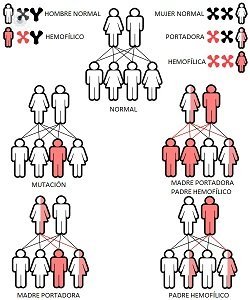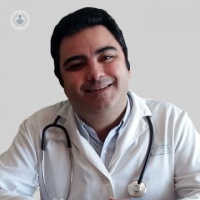Present and future of Haemophilia
Written by:Hemophilia is an inherited disease due to a disorder linked to chromosome X that produces a deficit in blood clotting. This makes people with haemophilia may suffer bleeding.

What is Hemophilia
Hemophilia is an inherited disease in which a genetic alteration results in a deficit of coagulation factor VIII in case of type A haemophilia, the most common (70% of total); factor IX deficiency for Type B (20% of total) or the more rare, caused by a defect factor XI (remaining 10%), known as haemophilia C. Haemophilia
Origin of Haemophilia
People are born with haemophilia. It is a disorder passed down through the genes from parent. The genes of Hemophilia A and B are located on the X chromosome, which is considered the X-linked diseaseWhen the father has hemophilia, but not the mother, no male child suffer. However, all daughters will be carriers of the gene. They sometimes show signs of bleeding and can transmit it to their descendants. For each of them there will be a 50% chance of Haemophilia, if male, and 50% chance, if female, it is also carrier. There is a remote possibility that, with the hemophiliac father and the surrogate mother, her daughter has hemophilia.
Incidence and symptoms of Hemophilia
Hemophilia is a rare disease, with an incidence of 1 / 10,000 for type A and 1 / 50,000 for the B type, being the type Haemophilia C almost anecdotally. Currently there are about 400,000 registered hemophilia patients in the world.
Haemophilia patients may have internal or external bleeding. Most occur in joints or muscles: knees, elbows and ankles and muscles of the upper arm, forearm, psoas, thigh and calf. When bleeding is repeated joint, the joint may be damaged and hurt. Repeated bleeding can cause other health problems such as arthritis with cartilage damage, which can become chronic, causing joint deformity or ankylosis with loss of joint function. The intensity and frequency of bleeding depends on the degree of Haemophilia that question.
Diagnosis of Haemophilia
Hemophilia is diagnosed by anamnesis and clinical history, delving into bleeding history, both personal and family, and suspecting it, quantifying the amount of clotting factor and activity, by the expert in Hematology. If the mother is a carrier tests before the birth of the baby can be performed with or chorionic villus sample of fetal blood.
Treatment of Hemophilia
Current treatment of Hemophilia is very effective, with management deficit blood factor. Bleeding stops when enough factor reaches the site where it originates. Such bleeding must be addressed quickly to minimize the damage to the joint, muscle or organ.Among the available treatment options we have factor concentrates, preferred therapeutic. They may be of human origin or obtained from genetically engineered cells which prevent the transmission of Hepatitis or HIV.Some patients with haemophilia A and minor bleeding can benefit from a synthetic hormone called desmopressin.Moreover, Prophylaxis is the regular use of clotting factor concentrates to prevent bleeds before they occur. They are administered 1, 2 or 3 times a week and provide stable blood levels of deficit factor.
Is there a cure for Hemophilia?
Today there is no cure for this disease. However, gene therapy is an interesting possibility to get it, either partially or completely. It has also been considered liver transplantation.In any case, the life expectancy of the patient depend on the proper treatment. Without it, many patients do not reach adulthood. However, with his life expectancies they are similar to non-hemophiliac population.
Precautions that should have Haemophilia
Hemophiliacs should refrain from contact sports such as boxing, martial arts or football. However, it should not be a taboo for them, because they can prevent bleeding by strengthening muscles and joints. They are recommended swimming, badminton, cycling or walking.Another situation that should be avoided is taking aspirin because it interferes with platelet aggregation, facilitating the onset of bleeding.


